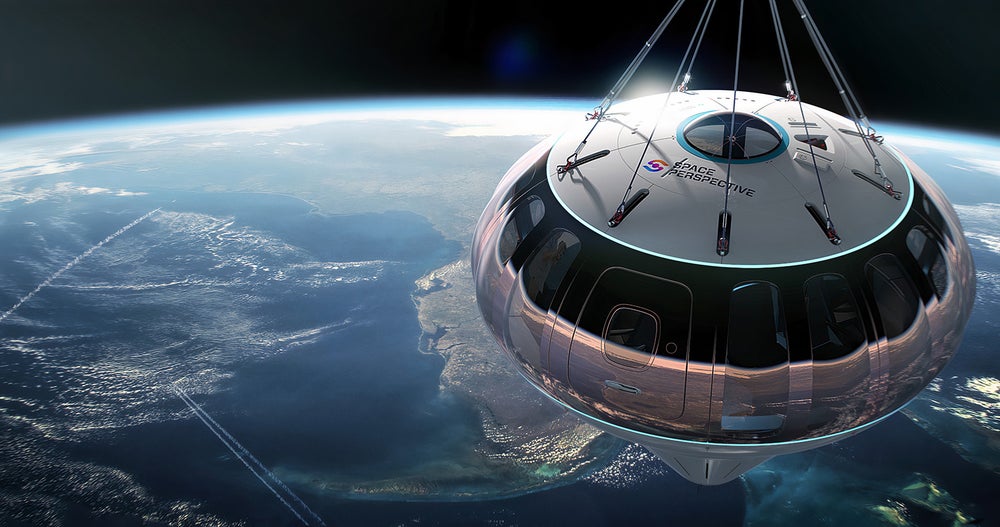Jane Poynter Wants to Take You to Space — and She’s Not Doing It Like the Billionaire Boys’ Rocket Club
“I’ll never forget, I had to write an essay when I was 16,” Space Perspective CEO and co-founder Jane Poynter tells Entrepreneur on International Women’s Day. “And the topic of the essay — and this was a national essay, this wasn’t just given by my teachers — was Would you like to be a nurse, a teacher, a veterinarian or a wife? I don’t have any problem with any of those four particular professional choices. However, it was very limiting.”

Space Perspective
Fortunately for the scientific community, Poynter didn’t let the narrow expectation of what a woman should be keep her from pursuing her talents and passions. As one of the first and few women pioneers in space exploration, Poynter’s career has been packed with groundbreaking discoveries and impressive milestones — from the research that came out of the two years and 20 minutes she spent living in Biosphere 2 during the early ’90s, up through her latest endeavor: the launch of Space Perspective, a company that aims to give more people than ever before the life-changing experience of space travel.
Inspiring women prove anything is possible
Growing up, Poynter had to contend with parochial beliefs like those evinced in the national essay prompt, but she was also lucky enough to be surrounded by inspiring women who showed her that she could do anything if she set her mind to it. “What was extremely fortunate for me was that I saw women doing extraordinary things,” Poynter says. “I grew up in a place where the first woman to sail single-handedly across the Atlantic almost lived next door — and then she sailed around the world. So it opened my eyes to the fact that there is so much out there. The possibilities are endless if you take a bull by the horns and go after them.”
That’s exactly what Poynter did when she tackled the ambitious Biosphere 2 research project at a time when most people lacked a fundamental understanding of what a biosphere even was. Those two years and 20 minutes spent inside the completely enclosed ecosystem gave Poynter an entirely new understanding of what it means to exist within our planetary biosphere, known as Biosphere 1. “The thing that was so surprising was being completely embedded in my biosphere,” Poynter says. “I knew moment to moment that the plants around me were giving me my oxygen to breathe, that the CO2 that I was exhaling was growing the food that we were eating — and we were eating so many sweet potatoes that we were turning orange. So we were becoming visibly part sweet potato. I could see the edges of my world.”
Poynter likens her experience in Biosphere 2 to that of astronauts who view Earth from space, saying, “It’s deeply moving. [Astronauts] see Earth from the outside looking in; we saw it from the inside looking out. It’s a new perspective that is deeply profound, and it lives with you for the rest of your life.”
Related: Why We Need More Women in STEM and How AI Could Help Us Get There
Entrepreneurial pathways, and advising Elon Musk
During her time in Biosphere 2, Poynter also took her first leap into entrepreneurship, co-founding Paragon Space Development Corporation, a space technology firm. “Paragon is all about the technologies of life support and environmental control, so it’s the oxygen, the CO2 and everything that allows us to thrive in an enclosed environment like that,” Poynter says. “And that was really the first step along this long path towards taking people to space that we’re now doing with Space Perspective.”
It was through her work with Paragon that Poynter crossed paths with one of space tourism’s most well-known figures: SpaceX founder and CEO Elon Musk. “The very first thing we did with [Musk] was build a small greenhouse to send plants to Mars,” Poynter says. “He went off to Russia to go get the rocket to fly our greenhouse to Mars, and on the way back, he decided he was going to start SpaceX, which was all very exciting. So our team actually helped him with some of his very first commercial proposal writing, did a whole kind of architecture of the rocket and the proposal writing with NASA, for them to be in that first commercial space-flight cohort of companies.”
That initial group of space-flight firms emerged as a de facto billionaire boys’ rocket club, including the likes of Musk’s SpaceX, Jeff Bezos’s Blue Origin and Richard Branson’s Virgin Galactic. But Poynter’s Space Perspective has a different take on space exploration, one that strives to make the transformational experience of viewing Earth from above more accessible, greener and cleaner than ever before. The company’s zero-emission, carbon-neutral Spaceship Neptune is powered by a SpaceBalloon™ the size of a football stadium — making for a spectacular and leisurely trip.
“We really wanted to have a flight that was gentle and calm so that when you’re up there, you can really absorb it,” Poynter says. “And that’s what the SpaceBalloon does. It goes to space at 12 miles an hour, and it’s this smooth flight that is two hours up, you’re two hours at the top, looking out at the Earth and two hours back down. By the way, you’re going to see the sunrise, so get ready to get up early. But it is going to be the most insane sunrise. I’ve seen videos of this, and it’s truly breathtaking.”

Image credit: Space Perspective
Related: What Traveling to Space Can Teach Us About Working and Living on Earth
How space travel alters our perspectives and behaviors
With Space Perspective, Poynter hopes to give as many people as possible the opportunity to travel to space, because she believes it’s an experience that will fundamentally change how we understand and care for our planet. “It’s that sort of Carl Sagan moment of just understanding that everything we are, all of human history, all of human society, has been lived out on this singular planet,” she says. “That’s a deeply profound and moving experience; at the same time, you suddenly understand that it is not that big.
“Scientists are beginning to look at how going to space affects people,” Poynter continues, “and have found a statistically significant increase in the amount of involvement that astronauts have with social and environmental causes when they return from space compared to when they left. So it’s not just a change in perspective: It actually changes how you are in the world, which is fascinating and has profound ramifications for us here on planet Earth.”
Space Perspective plans to take its first flight from Space Coast Spaceport, adjacent to Kennedy Space Center in Florida, as early as 2024, following a crewed test flight in 2023. Spaceship Neptune has the capacity for eight passengers, with tickets going for $125,000 each. “I am expecting to go up somewhere before the time we send up our first customers, because after all, if I’m going to send other people to space, I better go myself,” Poynter says. “And frankly, I can’t wait.”

Image credit: Space Perspective
Aerospace’s exciting future: inclusivity fuels innovation
Though much has changed over the course of Poynter’s 30 years in the male-dominated aerospace industry, there’s still room for improvement. “When I first got into aerospace, I was usually the only woman in the room,” she says. “Thankfully, that’s changed — still not 50/50 by any means, but there are a lot more women involved. And what I’m also excited about is that we’re beginning to see diversity of all sorts, and it’s critically important to me that we get all sorts of diversity of thought, culture and backgrounds, because vibrancy, creativity and innovation come from having a diversity of people involved in a singular endeavor and mission, especially like what we’re doing at Space Perspective.”
For any girls or women who are intimidated by the idea of pursuing careers in STEM, Poynter offers some hard-won words of wisdom. “If you really want to get into STEM and any STEM-related activities and professions, just do it,” she says. “It doesn’t matter if you’re feeling intimidated, you’ve got to do it anyway. We talk about how being an entrepreneur, you need to have persistence, you need to have courage. Both of those things are true, but they’re muscles. You actually have to exercise them. They don’t just happen magically — for most people. Some people are born with a tremendous amount of persistence and courage; for most of us, we have to work at it. It’s a muscle that has to be exercised.
Related: The First Black Woman to Travel to Space Shares How She Finds Solutions to the World’s Biggest Problems
“I have never focused on being a female entrepreneur,” Poynter adds. “I have focused on being the best entrepreneur to execute on the biggest vision I can to make the largest impact for humanity and our global biosphere. That is how I have always approached everything I have ever done. And it has really stood me well.”
Poynter has also benefited from banishing the word “impossible” from her vocabulary and keeping a favorite line from Theodore Roosevelt in mind. “‘Keep your eyes on the stars and your feet on the ground.’ I love that because it’s such inspiration,” Poynter says. “It’s think big, it’s do big, it’s reach for the stars, but really keep grounded in your own reality. And your own reality is that you can be so much more than you ever imagined you could be.”
For all the latest Business News Click Here
For the latest news and updates, follow us on Google News.
